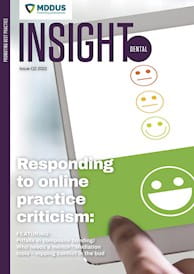 AS we move away from some of the challenges of the pandemic, such as enhanced PPE, fallow time and restrictive infection control procedures, we now face new ones, mainly a huge backlog of treatment and missed examination appointments.
AS we move away from some of the challenges of the pandemic, such as enhanced PPE, fallow time and restrictive infection control procedures, we now face new ones, mainly a huge backlog of treatment and missed examination appointments.
Government has pledged additional resources to assist with remobilisation but the impact of the pandemic on waiting times is still significant across the UK – and it is widely accepted by the profession that the backlog will continue for some time yet. The NHS Dental Statistics for England biannual report shows 15.8 million adults – a little over a third (35.5 per cent) of the total population – were seen by an NHS dentist in the 24 months to up to 31 December 2021.
I know from my own experience in general dental practice in Scotland that even patients who were well maintained before March 2020 are now presenting with multiple clinical issues which will require several appointments to resolve. Even as we become able to carry out more examination appointments, the treatment backlog continues to rise exponentially.
At MDDUS, we are regularly taking calls and assisting members in dealing with patient complaints relating to waiting times and treatment delays. All practices are unique and there is no one-size-fits-all solution for how to deal with these challenges. Fundamental to all patient care are the GDC Standards. Putting patients’ interests first and communicating effectively with patients are key standards that should be at the forefront as we emerge from the pandemic.
Effective communication
Practices should work as a team to develop an effective plan for tackling the backlog. There may be a perception amongst the public that it’s back to ‘business as usual’. Demand for appointments is increasing along with intolerance for longer wait times.
Undoubtedly, this leads to increased pressure on practices, particularly for reception staff on the front line.
In order to mitigate these challenges, practices need an effective communication policy. Input from all the members of the dental team can be invaluable. A communication strategy that the whole team is invested in is much more likely to be successful and may help to reduce complaints and frustration amongst the team and patients alike.
Tailored strategy
Practices can tailor a backlog strategy to their own circumstances. Points to consider include:
- Emergency patients. Do you have an effective triage system? Can you organise your appointment book so there is sufficient time to deal with emergencies appropriately?
- Working smarter. Can you utilise the skills of different members of the team more effectively?
- Consistent communication. Have regular practice meetings with dissemination of information to all team members so that patients are getting the same information.
- Examinations. Are there some groups needing priority? Are risk assessments appropriate? This may vary from practice to practice, depending on the patient demographic.
Despite best efforts, it is unlikely you will be able to meet all your patients’ expectations. Should a patient wish to make a complaint, direct them to the practice complaints policy to ensure their concerns are addressed in the most appropriate way. Of course, MDDUS is here to assist members with handling complaints.
Referral times
As well as our own backlogs, waiting times for secondary care appointments are also likely to be extended at the current time. Managing patients’ expectations in relation to hospital waiting times from the outset of a referral may reduce time spent having to deal with patient enquiries later.
Effective communication with secondary care partners to ensure that cases are triaged effectively can be beneficial and is very important if a patient needs to be seen urgently.
Wellbeing
Finally, with the relentless pressure to see more patients, do also take time to look after your own and your team’s wellbeing. As the demands and increasing frustrations of patients can threaten to overwhelm us, take time out away from the surgery to unwind and participate in self-care.
MDDUS offers a free, confidential wellbeing support service to its members available 24/7. Experienced healthcare professionals are only a phone call away and able to lend a helpful, supportive hand in dealing with life’s challenges.
There is no doubt that practice teams will rise to the current challenges, just as in the early days of the pandemic. Backlogs and staff shortages may bring new pressures but dental professionals are problem solvers and, to our credit, we always endeavour to do the best for patients.
Moira Duncan is a dento-legal adviser at MDDUSThis page was correct at the time of publication. Any guidance is intended as general guidance for members only. If you are a member and need specific advice relating to your own circumstances, please contact one of our advisers.
Read more from this issue of Insight Dental

Save this article
Save this article to a list of favourite articles which members can access in their account.
Save to library